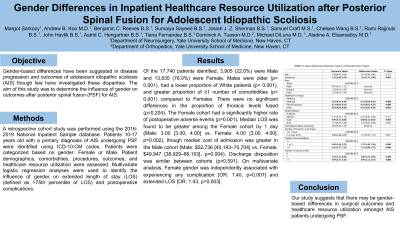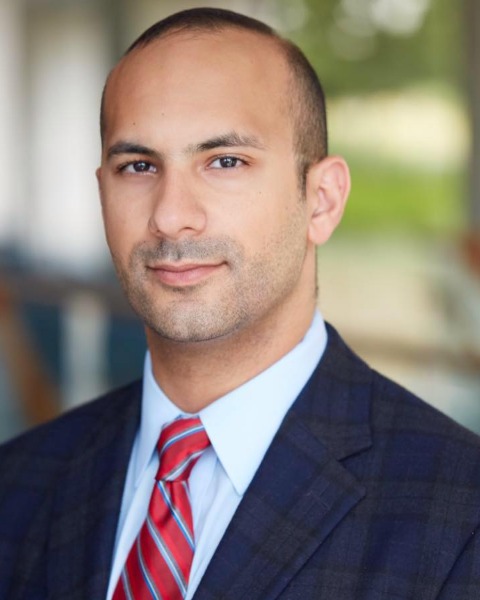Gender Differences in Inpatient Healthcare Resource Utilization after Posterior Spinal Fusion for Adolescent Idiopathic Scoliosis
Gender Differences in Inpatient Healthcare Resource Utilization After Posterior Spinal Fusion for Adolescent Idiopathic Scoliosis
Friday, April 21, 2023


Aladine A. Elsamadicy, MD
Resident Physician
Yale School of Medicine
New Haven, Connecticut, United States
ePoster Presenter(s)
Introduction: Gender-based differences have been suggested in disease progression and outcomes of adolescent idiopathic scoliosis (AIS) though few have investigated these disparities. The aim of this study was to determine the influence of gender on outcomes after posterior spinal fusion (PSF) for AIS.
Methods: A retrospective cohort study was performed using the 2016-2019 National Inpatient Sample database. Patients 10-17 years old with a primary diagnosis of AIS undergoing PSF were identified using ICD-10-CM codes. Patients were categorized based on gender: Female or Male. Patient demographics, comorbidities, procedures, outcomes, and healthcare resource utilization were assessed. Multivariate logistic regression analyses were used to identify the influence of gender on extended length of stay (LOS) (defined as >75th percentile of LOS) and postoperative complications.
Results: Of the 17,740 patients identified, 3,905 (22.0%) were Male and 13,835 (78.0%) were Female. Males were older (p < 0.001), had a lower proportion of White patients (p < 0.001), and greater proportion of ≥1 number of comorbidities (p < 0.001) compared to Females. There were no significant differences in the proportion of thoracic levels fused (p=0.204). The Female cohort had a significantly higher rate of postoperative adverse events (p=0.001). Median LOS was found to be greater among the Female cohort by 1 day (Male: 3.00 [3.00, 4.00] vs. Female: 4.00 [3.00, 4.00], p=0.002), though median cost of admission was greater in the Male cohort (Male: $52,736 [40,193–70,704] vs. Female: $49,947 [38,929–66,153], p=0.004). Discharge disposition was similar between cohorts (p=0.591). On multivariate analysis, Female gender was independently associated with experiencing any complication [OR: 1.40, p=0.001] and extended LOS [OR: 1.43, p=0.003].
Conclusion : Our study suggests that there may be gender-based differences in surgical outcomes and healthcare resource utilization amongst AIS patients undergoing PSF.
Methods: A retrospective cohort study was performed using the 2016-2019 National Inpatient Sample database. Patients 10-17 years old with a primary diagnosis of AIS undergoing PSF were identified using ICD-10-CM codes. Patients were categorized based on gender: Female or Male. Patient demographics, comorbidities, procedures, outcomes, and healthcare resource utilization were assessed. Multivariate logistic regression analyses were used to identify the influence of gender on extended length of stay (LOS) (defined as >75th percentile of LOS) and postoperative complications.
Results: Of the 17,740 patients identified, 3,905 (22.0%) were Male and 13,835 (78.0%) were Female. Males were older (p < 0.001), had a lower proportion of White patients (p < 0.001), and greater proportion of ≥1 number of comorbidities (p < 0.001) compared to Females. There were no significant differences in the proportion of thoracic levels fused (p=0.204). The Female cohort had a significantly higher rate of postoperative adverse events (p=0.001). Median LOS was found to be greater among the Female cohort by 1 day (Male: 3.00 [3.00, 4.00] vs. Female: 4.00 [3.00, 4.00], p=0.002), though median cost of admission was greater in the Male cohort (Male: $52,736 [40,193–70,704] vs. Female: $49,947 [38,929–66,153], p=0.004). Discharge disposition was similar between cohorts (p=0.591). On multivariate analysis, Female gender was independently associated with experiencing any complication [OR: 1.40, p=0.001] and extended LOS [OR: 1.43, p=0.003].
Conclusion : Our study suggests that there may be gender-based differences in surgical outcomes and healthcare resource utilization amongst AIS patients undergoing PSF.
